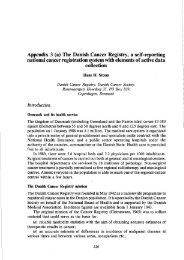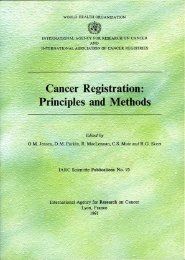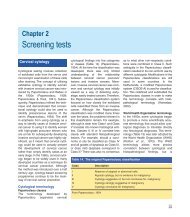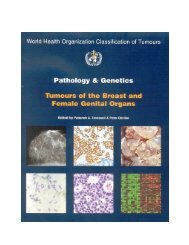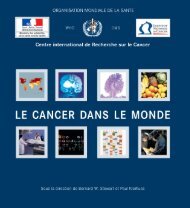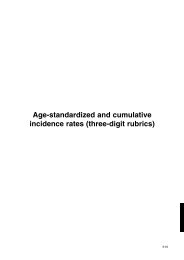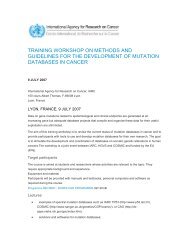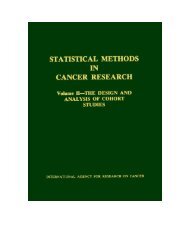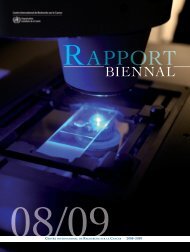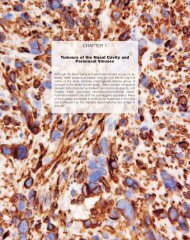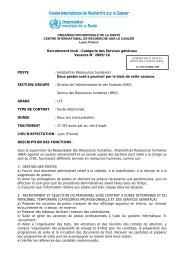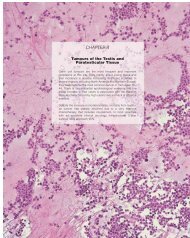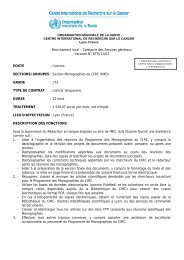world cancer report - iarc
world cancer report - iarc
world cancer report - iarc
Create successful ePaper yourself
Turn your PDF publications into a flip-book with our unique Google optimized e-Paper software.
EMERGING ISSUES IN<br />
PALLIATIVE CARE<br />
1. Adequacy of resources for care (especially<br />
and at least pain relief) from time<br />
of diagnosis of probably incurable <strong>cancer</strong>,<br />
in comparison with resources for<br />
anti<strong>cancer</strong> treatment (surgery radiotherapy,<br />
chemotherapy and the related diagnostic<br />
and monitoring processes).<br />
This is an issue throughout the <strong>world</strong><br />
but precise information is needed. It is<br />
worth the attention of health economists<br />
with an understanding of WHO<br />
principles.<br />
2. Being allowed to die – and allowing<br />
oneself to die: an issue in high technology<br />
environments.<br />
Attention should be given to the circumstances<br />
in which futile treatment should<br />
neither be initiated nor maintained.<br />
3. Education of professionals, especially<br />
doctors, with respect to the clinical sci-<br />
existing clinical science. Whether or not<br />
appropriate patients are referred to specialist<br />
palliative care services, as should<br />
be the case in difficult situations,<br />
depends on referral patterns and this fact<br />
may impede the delivery of optimum palliative<br />
care.<br />
The obstacles to the achievement of a<br />
“good” level of <strong>cancer</strong> pain relief community-wide<br />
in all countries, but especially<br />
developing countries, include not only the<br />
diffusion of knowledge regarding <strong>cancer</strong><br />
pain relief, policy change concerning drug<br />
availability, and education of health professionals<br />
and the public, but also more<br />
subtle and sensitive issues. There are<br />
countless examples of delays in implementation<br />
which are only explicable in<br />
terms of cultural factors which must be<br />
respected and understood.<br />
Some of these profound issues are spiritual<br />
and philosophical, and are felt especially<br />
keenly in developing countries.<br />
Questions such as the following may be<br />
300 Cancer management<br />
ence, attitudes and skills essential for<br />
contemporary palliative care.<br />
The courage and excellence of the USA<br />
national programme for doctors throughout<br />
the country may have global significance.<br />
4. Increasing incidence of <strong>cancer</strong> (especially<br />
the less curable types), notably in<br />
less industrialized countries, associated<br />
with the ageing of the population and continuing<br />
high levels of cigarette smoking<br />
and industrial pollution.<br />
In such circumstances the balance<br />
between attempts to cure and care<br />
becomes more crucial, and delivery of<br />
care must be efficient, effective and sustainable<br />
at the level of the whole population<br />
in need: a massive challenge.<br />
5. Assessment of adequacy of palliative<br />
care at total community level.<br />
6. Ethical issues relating to the disparity<br />
of care available in different circum-<br />
unspoken, or rarely articulated:<br />
- Does the adoption of a recognized strategy<br />
for <strong>cancer</strong> pain relief run the risk of<br />
damaging the spiritual fabric of our society,<br />
of destroying our way of thinking about<br />
the meaning of life, of suffering, of death?<br />
- When we are so short of resources, why<br />
should we spend so much time, money<br />
and trouble on pain treatment in those<br />
who can no longer work, instead of trying<br />
to cure more people?<br />
- Why is <strong>cancer</strong> pain relief still so poor in<br />
the West, even in prestigious <strong>cancer</strong> centres?<br />
These matters need discussion in situations<br />
of trust, and in an atmosphere of<br />
partnership.<br />
It is essential that those seeking to introduce<br />
the WHO approach to pain relief are<br />
deeply aware of the personal, cultural and<br />
spiritual context into which this new<br />
mode of thinking and acting is to be introduced.<br />
The beneficial outcomes to the<br />
patients and their families are so signifi-<br />
stances throughout the <strong>world</strong> (differences<br />
between countries and within<br />
countries): can we continue to tolerate<br />
such disparities in this millennium?<br />
Daniel Callaghan, the founder of the<br />
revered Hastings Institute for Ethics has<br />
recently written: “The greatest importance<br />
of palliative care medicine is not<br />
simply the benefit it can bring at the end<br />
of life, but its recasting of the goals of<br />
medicine, trying to better balance care<br />
and cure, and in all of life not just at its<br />
end… Most needed is what I call a ‘sustainable<br />
medicine’… that accepts death<br />
as part of the human condition, that is<br />
not obsessed with the struggle against<br />
disease, that understands progress as<br />
learning better how to live with, and die<br />
with, mortality as a fundamental mark<br />
of the human condition” (Callaghan D, J<br />
Palliat Care, 8: 3-4, 2000; Callaghan D,<br />
The troubled dream of life, New York,<br />
1993).<br />
cant that these outcomes themselves<br />
may be the key tool for change: such<br />
change must come from within the community.<br />
However, wise leadership from<br />
senior administrators and clinicians can<br />
have dramatic consequences.<br />
The challenge now in achieving better levels<br />
of global <strong>cancer</strong> pain relief is a more<br />
appropriate understanding of the psychological<br />
matrix within which the means to<br />
relieve that pain must operate. Awareness<br />
of the total ecological matrix – with its historical,<br />
social, economic, psychological<br />
and spiritual components – is essential if<br />
<strong>cancer</strong> pain relief is to be achieved. In<br />
some respects, psychological and spiritual<br />
development in some so-called developing<br />
countries is far in advance of the rest of<br />
the globe – and there is a need for all to<br />
recognize exchange-in-partnership as the<br />
most promising means of advance for the<br />
third millennium.<br />
Those working in the policy area of<br />
health care and with patients should



